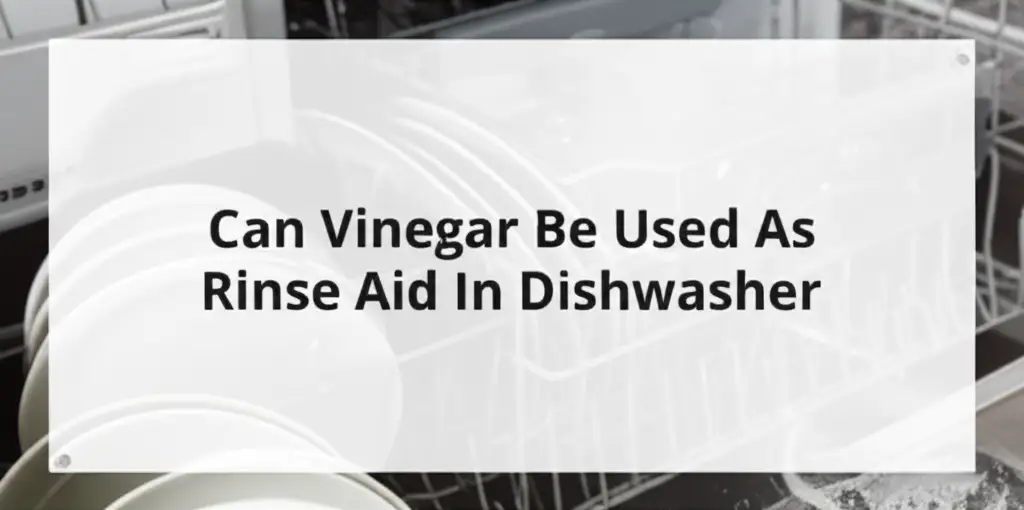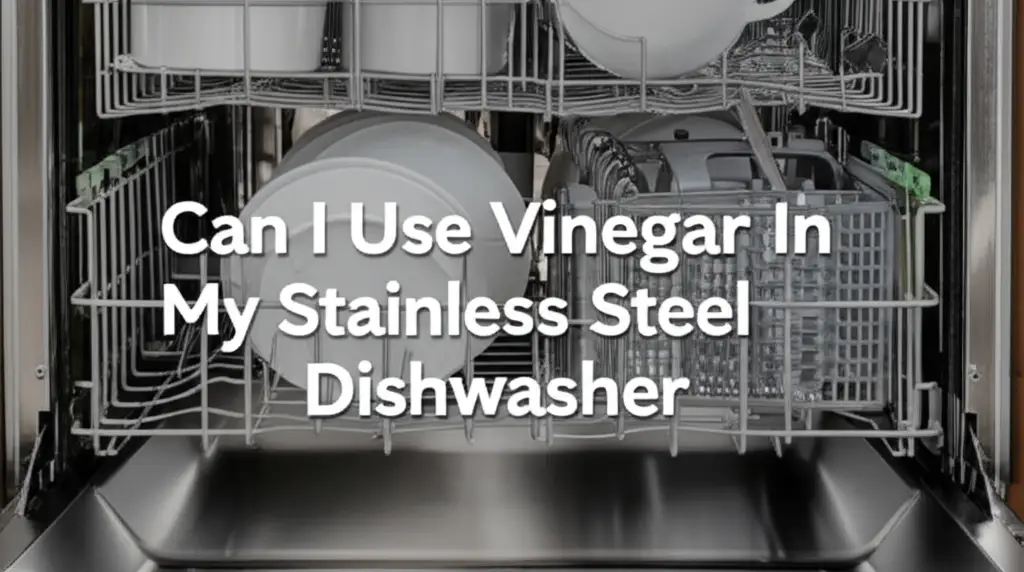· Katria Melrose · Cleaning Tips · 13 min read
Can Vinegar Be Used As Rinse Aid In Dishwasher

Can Vinegar Be Used As Rinse Aid In Dishwasher?
Ever wondered if that bottle of white vinegar in your pantry holds the secret to spotless dishes? Many people ask, “Can vinegar be used as rinse aid in dishwasher?” It is a common question for homeowners seeking natural, cost-effective cleaning solutions. Traditional rinse aids promise streak-free results, but vinegar offers an appealing alternative. This article explores how vinegar functions as a rinse aid, its benefits, proper usage, and important considerations. We will help you achieve cleaner dishes with a simple, household staple.
Takeaway:
- Yes, white vinegar can replace commercial rinse aid. It helps dishes dry without spots and streaks.
- Pour white vinegar into the rinse aid dispenser. Do not mix it with dish soap.
- Vinegar is safe for most dishwashers. It does not harm seals or internal parts when used properly.
- Consider water hardness and dish materials. Adjust usage based on your home’s water quality.
- Enjoy eco-friendly and cost-effective dishwashing. Vinegar offers a natural cleaning alternative.
You can indeed use white vinegar as a rinse aid in your dishwasher. This common household item helps reduce water spots and streaks on dishes, especially in hard water areas. Its acidic properties break down mineral deposits, leaving glassware and cutlery sparkling clean. Many find it a safe and eco-friendly alternative to commercial products.
Understanding How Rinse Aid Works
Rinse aid plays an important role in getting clean dishes from your dishwasher. Its job is simple: help water sheet off surfaces instead of beading up. This prevents water from leaving spots or streaks as it dries. Commercial rinse aids contain surfactants. These chemicals reduce the surface tension of water.
When water has lower surface tension, it flows off dishes more easily. This helps dishes dry faster and more completely. Without rinse aid, water can cling to dishes, leaving behind mineral deposits. These deposits appear as white spots or streaks. Rinse aid is especially helpful in areas with hard water. Hard water has more dissolved minerals, which can cause more noticeable spots.
The Science Behind Vinegar as a Rinse Aid
Vinegar works similarly to commercial rinse aids but through a different chemical process. It is a natural acid, primarily acetic acid. This acidity is key to its cleaning power. When you use vinegar, it neutralizes alkaline mineral deposits. These deposits are common in hard water.
Hard water contains minerals like calcium and magnesium. These minerals cause the white film you sometimes see on dishes. Vinegar dissolves these mineral deposits. It prevents them from sticking to your dishes as they dry. This results in clearer, spot-free dishes. Vinegar also helps break down grease and food residue. It aids in the overall cleaning process.
Its acidic nature also makes water sheet off surfaces more effectively. This action mimics the function of surfactants in commercial rinse aids. Vinegar does not leave behind any harmful chemical residues. This makes it a popular choice for those seeking a more natural option. Many people find that using vinegar is a cost-effective alternative.
Benefits of Using Vinegar in Your Dishwasher
Using vinegar in your dishwasher offers several compelling advantages. It is more than just a substitute for rinse aid. Vinegar brings a range of benefits that impact both your dishes and your appliance. One primary benefit is its ability to combat hard water spots. These stubborn spots are a common frustration. Vinegar’s acidity effectively dissolves the mineral buildup that causes them. This leaves your glassware and cutlery crystal clear.
Beyond spot removal, vinegar acts as a powerful cleaner for the dishwasher itself. It helps prevent limescale and soap scum accumulation inside the machine. This keeps your dishwasher running efficiently. Regular use of vinegar can extend the lifespan of your appliance. It also helps eliminate unpleasant odors. Dishwashers can harbor smells from leftover food particles. Vinegar neutralizes these odors, leaving your machine fresh. Many people find it helps clean the entire appliance. For more detailed information, you can read about how to clean dishwasher with vinegar.
Another significant benefit is its eco-friendliness. Vinegar is a natural product, biodegradable, and non-toxic. It breaks down into harmless components after use. This makes it a safer choice for your family and the environment. You avoid introducing harsh chemicals into your home and water system. Finally, vinegar is incredibly cost-effective. It is a common pantry item, usually much cheaper than commercial rinse aids. This makes it an accessible solution for anyone looking to save money.
How to Properly Use Vinegar as a Rinse Aid
Using vinegar as a rinse aid is simple. Follow these steps for the best results. First, you need white distilled vinegar. Avoid apple cider vinegar or other types, as they can leave residues or smells. Locate your dishwasher’s rinse aid dispenser. This is usually a small compartment near the detergent dispenser. It often has a cap that twists or pops open.
Pour white vinegar directly into this dispenser. Fill it to the “max” line, just as you would with commercial rinse aid. The dishwasher releases a small amount during the final rinse cycle. This ensures your dishes get the benefit of the vinegar. You do not need to add vinegar to the main detergent compartment. Mixing it with dish soap can create too many suds. It can also reduce the effectiveness of both products. If you are curious about using vinegar in other parts of your dishwasher for cleaning purposes, you can learn where to put vinegar in dishwasher to clean.
Refill the dispenser as needed. Most dishwashers will signal when the rinse aid is low. You can expect to refill it every few weeks, depending on your wash frequency. Some people prefer to place a small, open cup of vinegar on the top rack. This method also works, but the dispenser provides a controlled release. Using the dispenser is generally more efficient and consistent. It prevents too much vinegar from being dispensed at once.
Important Considerations and Potential Drawbacks
While using vinegar as a rinse aid offers many benefits, it is important to consider some potential drawbacks and safety measures. For most modern dishwashers, using white distilled vinegar is perfectly safe. Dishwasher manufacturers generally design their appliances to withstand mild acids. However, some older models might have rubber seals or gaskets that could potentially degrade over time with continuous exposure to strong acids. White vinegar is a weak acid, so this risk is minimal. If you have concerns, check your dishwasher’s manual or consult the manufacturer.
One common question arises: Can vinegar be used in dishwasher generally? The answer is typically yes, for various cleaning functions. However, avoid using vinegar in dishwashers with specific types of internal parts, such as certain aluminum components. This is rare in modern machines. Also, never mix vinegar directly with bleach inside your dishwasher or anywhere else. Combining these two chemicals creates dangerous chlorine gas. Always use them separately and rinse thoroughly between uses if you alternate.
Another consideration is the strength of the vinegar. Always use plain white distilled vinegar, typically 5% acetic acid. Do not use cleaning vinegar, which is stronger (around 6-10%), as it could be too harsh. While rare, some users report a faint vinegar smell on dishes if too much is used or if their water is very soft. If this happens, reduce the amount of vinegar in the dispenser or try diluting it slightly with water. For hard water, however, the full strength is usually fine. Using vinegar is generally effective, but it might not perform as well as commercial rinse aids in extremely hard water conditions. You might still see some minor spotting if your water is exceptionally hard.
Addressing Concerns: Is Vinegar Safe for Your Dishwasher?
A common worry for many homeowners is whether using vinegar will harm their dishwasher. The good news is that for the vast majority of modern dishwashers, white distilled vinegar is safe. Dishwashers are built with materials that can handle the mild acidity of vinegar. The internal components, like stainless steel tubs and plastic parts, are designed to be resistant to various cleaning agents. These parts do not corrode or degrade from vinegar. The seals and gaskets are typically made from durable rubber or silicone. These materials withstand the mild acid without issues.
Vinegar’s effectiveness as a rinse aid has been widely adopted due to its safety profile. For example, if you are wondering, “Can I use vinegar in my stainless steel dishwasher?” the answer is a resounding yes. Stainless steel is highly resistant to acids and will not be damaged by vinegar. In fact, vinegar often helps to clean and shine stainless steel surfaces. It removes water spots and fingerprints.
It is important to differentiate between using vinegar as a rinse aid and for deep cleaning cycles. When used as a rinse aid, only a small amount of vinegar is dispensed during the final rinse. This limited exposure does not pose a threat to your appliance. For deep cleaning, you might run an empty cycle with a cup of vinegar. This also helps clean the machine without causing harm. The key is using white distilled vinegar, which is about 5% acetic acid. Industrial or cleaning-strength vinegars are much stronger and should not be used. They could potentially be too harsh for certain components. As long as you stick to standard white vinegar, your dishwasher should remain in excellent condition.
Optimizing Dishwasher Performance with Vinegar
Using vinegar as a rinse aid is a great start. You can further optimize your dishwasher’s performance for sparkling results. Start by ensuring proper loading. Do not overcrowd the dishwasher. This allows water and detergent to reach all surfaces effectively. Proper spacing prevents dishes from blocking spray arms. It ensures thorough cleaning and rinsing.
Check your water temperature. Dishwashers generally perform best with hot water. Most models heat the water themselves, but ensure your home’s water heater is set to at least 120°F (49°C). Hot water helps dissolve detergent and rinse aid more efficiently. It also aids in sanitizing dishes and preventing mineral buildup.
Regularly clean your dishwasher’s filter. Food particles and grease can accumulate in the filter. This reduces cleaning effectiveness and can leave residue on dishes. Refer to your dishwasher manual for instructions on how to remove and clean the filter. This simple maintenance step makes a big difference. Many resources are available if you need to know how to clean your dishwasher with vinegar and baking soda.
Consider your water hardness. If you live in an area with very hard water, vinegar alone might not fully eliminate all spots. You might need to use a dishwasher salt if your machine has a water softener. This extra step can further improve results. Adjust the amount of vinegar based on your water hardness. You can use slightly more for very hard water. Experiment to find the perfect balance. These combined efforts will maximize your dishwasher’s efficiency and deliver consistently clean, spot-free dishes.
Vinegar vs. Commercial Rinse Aids: A Comparison
When it comes to getting spot-free dishes, both vinegar and commercial rinse aids aim for the same goal. However, they achieve it through different means and offer distinct advantages and disadvantages. Commercial rinse aids typically contain synthetic surfactants and drying agents. These chemicals are highly effective at reducing water surface tension. They promote rapid sheeting and quick drying, often leaving dishes exceptionally shiny. They are formulated for maximum performance, especially in hard water conditions. One common question is can I use vinegar instead of rinse aid in dishwasher? The short answer is yes.
Vinegar, on the other hand, is a natural alternative. Its primary active ingredient is acetic acid. This acid works by dissolving mineral deposits from hard water. It neutralizes the alkalinity that causes spots and film. Vinegar also helps water run off dishes smoothly, much like a surfactant. It leaves no chemical residue. This makes it an appealing option for those seeking a greener approach.
Here is a comparison:
- Effectiveness: Commercial rinse aids often provide slightly superior spot and streak prevention, especially in extreme hard water. Vinegar is very effective for most homes and significantly reduces spots.
- Cost: Vinegar is considerably cheaper than commercial rinse aids. A large bottle of white vinegar costs a few dollars and lasts for many wash cycles.
- Ingredients: Commercial rinse aids contain synthetic chemicals. Vinegar is a natural, food-grade product. This makes it biodegradable and non-toxic.
- Environmental Impact: Vinegar has a minimal environmental footprint. It breaks down harmlessly. Synthetic chemicals in commercial rinse aids can have a greater environmental impact.
- Odor: Commercial rinse aids are usually odorless. Vinegar can sometimes leave a faint smell in the dishwasher or on dishes, especially if too much is used or water is soft. This typically dissipates quickly.
- Compatibility: Both are compatible with most dishwashers. Some older dishwasher seals might be less resistant to acid over very long periods with strong vinegar, though this is rare with standard white vinegar.
Ultimately, the choice between vinegar and commercial rinse aid depends on your priorities. If maximum shine and convenience are key, commercial products might be preferred. If you prioritize natural ingredients, cost savings, and environmental benefits, vinegar is an excellent choice.
FAQs About Using Vinegar as Rinse Aid
Can white vinegar damage my dishwasher?
No, white distilled vinegar (5% acetic acid) is safe for most modern dishwashers. Dishwashers use materials resistant to mild acids like stainless steel and durable plastics. It does not harm seals or internal components when used properly as a rinse aid. Avoid using stronger cleaning vinegar or mixing it with bleach.
How often should I put vinegar in the rinse aid dispenser?
You should fill the rinse aid dispenser with white vinegar whenever it signals low, just like with commercial rinse aid. This is typically every few weeks, depending on how often you run your dishwasher. Some people top it off once a week as part of their routine.
Will my dishes smell like vinegar?
It is rare for dishes to smell like vinegar after a cycle. The small amount dispensed during the final rinse is usually diluted and rinsed away. If you notice a faint smell, it might indicate you are using too much or have very soft water. Try using slightly less vinegar in the dispenser.
Can I use apple cider vinegar instead of white vinegar?
It is best to use white distilled vinegar. Apple cider vinegar contains sugars and other organic compounds that can leave a sticky residue or a stronger odor on your dishes and inside the dishwasher. White vinegar is pure and does not leave unwanted traces.
Does vinegar help clean the dishwasher too?
Yes, using vinegar as a rinse aid also provides a mild cleaning benefit to your dishwasher. Its acidic properties help break down hard water deposits, soap scum, and grease buildup inside the machine. This contributes to better overall machine hygiene and efficiency over time.
What if I have very hard water?
For very hard water, vinegar will significantly reduce spots but might not eliminate them entirely. You may still see some minor residual spotting. In such cases, consider using dishwasher salt if your machine has a dedicated salt dispenser or occasionally run an empty cycle with a cup of vinegar for a deeper clean.
Conclusion
The question “Can vinegar be used as rinse aid in dishwasher?” has a clear answer: yes, it can. White distilled vinegar is an effective, eco-friendly, and cost-effective alternative to commercial rinse aids. It works by neutralizing mineral deposits from hard water, helping water sheet off your dishes for a sparkling, streak-free finish. Its mild acidity also contributes to a cleaner, fresher-smelling dishwasher.
By understanding its benefits, proper usage, and minor considerations, you can confidently integrate vinegar into your dishwashing routine. This simple pantry staple offers a powerful solution for achieving pristine dishes without harsh chemicals or high costs. Give it a try and experience the difference yourself. Your dishes, your wallet, and the environment will thank you. Ready to make the switch? Just pour and enjoy the shine!
- Dishwasher Hacks
- Vinegar Cleaning
- Eco-Friendly Dishwashing





